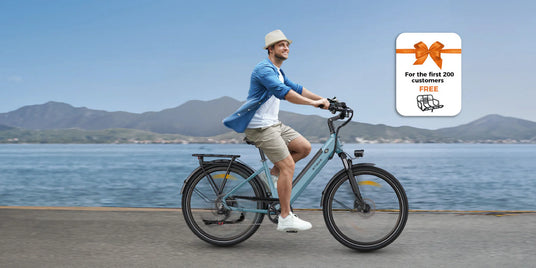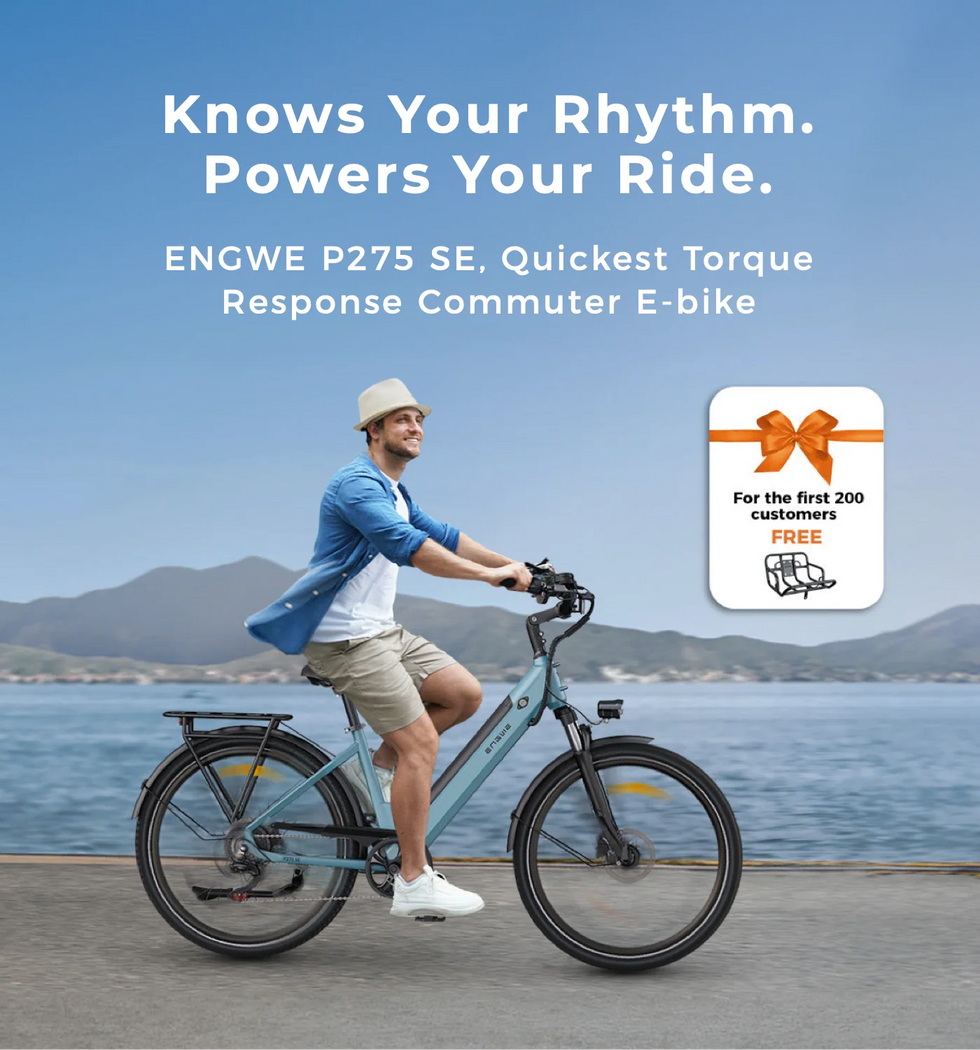Electric bikes have redefined the way people ride. It opens doors to smoother commutes, longer adventures, and greater accessibility for cyclists. For many, the first thought is to upgrade their regular bike with a hub motor conversion kit. At first glance, it might look like a cheaper way to enjoy the benefits of an e-bike. However, these kits often come with hidden expenses far beyond the initial purchase. While the idea sounds practical, conversions can be complex, costly, and may not deliver the same level of performance or reliability as a purpose-built electric bike. What may start as a budget-friendly shortcut can soon become a complicated and expensive project.
Choosing a purpose-built electric bike eliminates those extra hurdles and provides a complete solution from day one. With trusted brands like ENGWE, riders receive a fully integrated system with battery, motor, frame, and controls. All these systems are engineered to work in harmony. This means less trial and error, fewer unexpected repairs, and far more reliability over time.
Instead of paying piecemeal for upgrades and adjustments, you invest once in a well-designed machine that delivers performance, durability, and value for years to come. In the long run, purchasing a ready-made e-bike is not just simpler, it often proves to be the smarter financial choice.
Conversion Kits: What They Really Offer

A conversion kit allows you to retrofit your existing bike. Here, hub motor kits are mounted inside the front or rear wheel, delivering electric power directly to the wheel. Mid-drive kits, on the other hand, replace the bottom bracket area, sending power through the bike’s chain and gears. Both can provide noticeable assistance, but their performance depends heavily on the strength and compatibility of the original bike frame.
While conversion kits can be exciting, they also come with trade-offs. Installation requires mechanical knowledge, and even then, problems like misalignment, poor weight distribution, and inconsistent wiring may arise. Maintenance can be tricky because every component comes from a separate manufacturer rather than one integrated system. Most importantly, the riding experience of a converted bike will not match the seamless design of a purpose-built electric bike like ENGWE bikes.
Why You Cannot Turn a Normal Bike Into an ENGWE Model
You cannot convert a normal bike into an ENGWE model, such as the EP-2 Boost or the P275 SE. ENGWE’s bikes are not just standard bicycles with motors added. They are carefully engineered systems where the motor, battery, electronics, frame geometry, and safety features are designed to work together.
Take the ENGWE P275 SE, for example. This bike features a mid-drive motor with torque-sensing technology, allowing it to respond naturally to how hard you pedal. The motor does not just push you forward. It blends with your effort, creating a smooth, responsive ride. Or look at the ENGWE EP-2 Boost, which uses a powerful rear hub motor combined with a foldable frame for maximum portability. No aftermarket kit can recreate these unique designs on a normal bicycle frame.
In other words, while a conversion kit can turn your old bike into an e-bike, it will never become an ENGWE e-bike.
Types of Electric Bike Conversion Kits
To successfully convert your bike into an e-bike, you need a conversion kit. However, the conversion kit you get depends on your goals and the type of bike you have. There are three major types of electric bike conversion kits, and they include.

-
Hub Motor Kits
Hub motors are the most common conversion system. They fit either the front or rear wheel and are relatively simple to install. Front-hub kits offer easier installation and better weight distribution, while rear-hub kits provide stronger traction for hill climbing.
-
Mid-Drive (Crank) Systems
Mid-drive kits place the motor near the bottom bracket, driving the pedals directly. These kits provide higher torque, making them ideal for steep terrain or heavier bikes. They are also more compatible with various gear systems but require slightly more installation work.
-
Belt- or Friction-Drive Kits
Less common, these systems use rollers to drive the bike’s wheel. While convenient for some bikes, tyre wear can be an issue over time.
ENGWE Electric Bikes as a Conversion Alternative
While conversion kits may seem appealing at first glance, they often come with hidden challenges such as compatibility issues, frequent adjustments, and long-term maintenance costs. ENGWE eliminates these concerns by offering a full range of purpose-built electric bikes, each designed to give riders a smooth, reliable, and safe experience. Instead of retrofitting an old frame, ENGWE provides complete solutions where the motor, battery, and frame work together seamlessly.
ENGWE EP-2 Boost
The EP-2 Pro is one of ENGWE’s most popular folding fat-tire e-bikes. It is designed for riders who need flexibility. Its fat tires provide stability on rough terrain, while the folding frame makes it practical for urban living. Compared to a conversion kit, the EP-2 Pro saves riders the stress of piecing together parts and delivers a ready-to-ride machine built for durability.
ENGWE P275 SE
For women, step-through, light-weight, or commuter e-bike enthusiasts, the P275 SE provides a sleek alternative. It is designed for efficiency, smooth pedalling, and daily commuting ease. Riders who consider conversion kits for urban use often face challenges like uneven power delivery or bulky attachments. The P275 SE avoids these issues by offering an integrated system built for city performance and reliability.
ENGWE LE20

For cargo, mid-drive, or long-range needs, the LE20 provides superior carrying capacity and an extended electric range. Its mid-drive system is robust and reliable, perfect for riders who transport goods or travel longer distances regularly.
While these bikes are not conversion kits in the strict sense, they are excellent alternatives for riders who want the full benefits of an e-bike without any installation challenges.
The Cost-Effectiveness Factor: The Hidden Costs of Conversion
The primary reason most bikers consider conversion is the perceived cost-effectiveness. However, this process is accompanied by several costs hidden in plain sight.
-
The Illusion of a Cheaper Start
Conversion kits often appear attractive because of their low upfront price. On paper, it seems simple. You just need to buy a kit, attach it to your bike, and ride away with electric power. But many riders quickly realize the initial savings are misleading. A kit rarely includes every essential component, and the added costs pile up fast. Stronger brakes, reinforced wheels, or even new gearing are sometimes needed to handle the extra power. Add installation fees or the cost of correcting mistakes during DIY setup, and the cheap solution becomes unexpectedly expensive.
-
Compatibility and Adjustment Costs
No two bikes are built exactly alike. That means not every conversion kit fits every frame. Riders may have to purchase adapters, custom mounts, or entirely new bike parts just to make the system work. Even after setup, constant adjustments may be necessary to balance weight, fix wiring, or troubleshoot electrical errors. These recurring expenses and inconveniences make conversion kits less practical than they seem at first glance.
What ENGWE Offers Instead
ENGWE electric bikes remove this uncertainty by delivering a complete product. Every bike is purpose-built with carefully matched components that are designed to work in harmony. Instead of forcing old parts to adapt, ENGWE gives you a fully engineered system tested for performance and safety. The result is peace of mind because there are no hidden modifications, no compatibility struggles, and no trial-and-error spending.
-
Long-Term Value Over Short-Term Savings
When you buy a conversion kit, you are often trading long-term stability for temporary savings. Kits tend to wear out quicker because they are added to a frame not designed for electric power. Over time, replacements and repairs make the total cost climb higher than buying a complete e-bike from the start. ENGWE flips this equation. With durable frames, reliable batteries, and professional assembly, their bikes last longer, demand fewer repairs, and save money year after year.
-
Warranty, Service, and Support
One of the biggest hidden expenses of conversion kits is the lack of after-sales support. When something breaks, you are often left to figure it out yourself. ENGWE changes that by offering warranties and customer support that protect your investment. That backup not only reduces repair costs but also adds lasting value that DIY kits cannot match.
What Sets ENGWE Apart
-
Innovative Design and Engineering
ENGWE is known for crafting electric bikes that merge innovation with practicality. Their foldable frames, integrated battery systems, and sleek aesthetics are designed not just for visual appeal, but also for user convenience. These design features make ENGWE bikes versatile.
-
Range of Options for Every Rider
From compact city commuters like the ENGWE EP-2 Boost, to powerful off-road companions like the P275 Pro, the brand offers a wide spectrum of models to suit different riding needs. Riders seeking daily urban transport, long-distance touring, or even mixed-terrain adventures can all find a suitable option within ENGWE’s catalogue.
-
Powerful Hub-Motor Performance
ENGWE equips its bikes with robust hub motors that deliver strong acceleration and reliable assistance across terrains. With options reaching up to 1000W of power in certain models, these bikes ensure smooth rides on flat roads while also providing the muscle to tackle steep inclines and off-road conditions.
-
Battery Technology and Long-Lasting Range
The hallmark of an ENGWE bike lies in its impressive battery capacity. Its models come with large-capacity lithium-ion batteries that provide extended ranges, often exceeding 60–100 km per charge depending on usage. This gives riders the confidence to go further without worrying about frequent recharges.
While several bikers convert their regular bikes to e-bikes, only a few enjoy the dividends of this investment in the long run. Purchasing durable and affordable e-bikes from brands like ENGWE, not only helps you avoid costs but also offers you purpose-built electric bikes, each designed to give riders a smooth, reliable, and safe experience.

